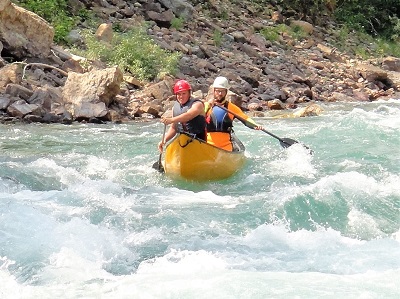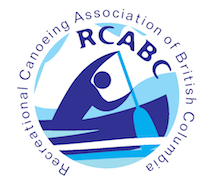
Canoeing on rivers is a fun and challenging sport. Skilled paddlers in an appropriately outfitted canoe can take on surprisingly difficult whitewater. River canoeing can be quite diverse, ranging from gentle floats to intense solo playboating in short modern canoes to multi-day trips carrying 300lbs of gear on remote whitewater rivers. There are RCABC programs for all of these styles of river canoeing.
Also see RCABC's River Rescue Program and Advanced Moving Water Program.
Because of the nature of BC's cold water, often continuous rapids and ever present wood debris hazards, safety and preparedness are a major focus of RCABC's moving water program. Group sizes are small and RCABC moving water instructors have achieved high standards to earn their certification.
RCABC MOVING WATER COURSES
- MOVING WATER LEVEL 1 - TANDEM
- MOVING WATER LEVEL 2 - SOLO
- MOVING WATER INSTRUCTOR
- MOVING WATER CLINIC
WHO IS THIS COURSE FOR?
The RCABC Moving Water Level 1 course is the foundation course for anyone wishing to become a river canoeist. It is also recommended for those that have limited experience but need formal training to improve their skills communication and safety knowledge. River canoeing opens doors to people seeking a diversity of interests including:
- Wilderness tripping
- Whitewater playboating
- Viewing wildlife, plant and bird life and geology
- Fishing
- Exercise and fitness
- Team and communication building
PREREQUISITES – RCABC Lakewater Level 1 or equivalent
DURATION – 16 hours
CONTENT
Outline of RCABC Moving Water Level 1 Course: Moving Water Paddler Levels
Rivers features such as eddy lines, waves, boulders, wood debris and complex currents must be recognized and managed in order to navigate most BC rivers safely. This course introduces you to the complex nature of rivers, teaches how to manage and prepare for the challenges, and what to do when things don't go as planned. Skills and theory include:
- Entering and exiting eddies
- Ferrying and back ferrying to cross the river
- River reading and group travel
- River Hazards
- Rescues and swimming in a rapid
- Safety Equipment, flotation and outfitting a canoe
- Advanced strokes, braces and manoeuvres from RCABC Level 3 Lakewater course.
- Environment and access concerns
WHO IS THIS COURSE FOR?
The RCABC Moving Water Level 2 course is for anyone that wants to learn or improve their skills while river canoeing solo (one person in the canoe). Are you are looking for the skills to go on wilderness river trips, adrenaline charged whitewater runs or for becoming a river canoeing leader in your community? This course will help you develop those skills and achieve your goals. The course can be tailored to accommodate students in full size tripping canoes, small modern whitewater playboats or anything in between. People most commonly taking the course are:
- Playboaters
- Solo river trippers
- Trip leaders in clubs or other organizations that may need to solo at times
- Tandem canoeists wishing to improve their understanding of the canoe in moving water
- Canoeists wishing to become RCABC Moving Water Instructors
- Outdoor adventure program leaders
PREREQUISITES – RCABC Moving Water Level 1 or equivalent
DURATION – 16 hours
CONTENT
Outline of RCABC Moving Water Level 2 (Solo) Course: Moving Water Paddler Levels
The RCABC Moving Water Level 2 course builds on skills learned in Level 1 (tandem), but all skills are practiced solo, including:
- Entering and exiting eddies
- Ferrying and reverse ferrying to cross the river
- River Hazards
- Solo rescues, self rescues and swimming in a rapid
- Safety Equipment, flotation and outfitting a canoe
MOVING WATER INSTRUCTOR
WHO IS THIS COURSE FOR?
The RCABC Moving Water Instructor course requires competent solo and tandem canoeing skills, demonstration ability and safety and rescue ability on up to Grade 3 rivers. It focuses on the ability to teach the content of RCABC Moving Water Level 1&2 courses. The certificate is often sought by:
- Experienced recreational canoeists wanting to take their skills to the next level
- River canoeing leaders or guides
- Private instructors
- Outdoor adventure program instructors
PREREQUISITES – RCABC Moving Water Level 1 and 2 and river canoeing experience. Minimum one year as a Lakewater Instructor.
DURATION – 40 hours
RECERTIFICATION - A 2 day clinic every 3 years conducted by a Master Instructor.
CONTENT
Outline of RCABC Moving Water Instructor Course (Currently only available in the RCABC Instructor Manual) Moving Water Instructor
- Thorough review of all Moving Water Level 1&2 content
- Review of Lakewater Instructor content
- Instruction methods and locations
- Advanced rescue
- Offside Paddling
- Leadership and group management
- Demonstration and practice teaching scenarios
- Eskimo roll (optional)
WHO ARE CLINICS FOR?
RCABC allows instructors to run partial courses called 'clinics' which are based on an RCABC certificate course. Clinics are intended to add the flexibility for RCABC instructors to teach partial canoeing courses, without the need to fulfil the complete requirements of a certificate course.
Here are a few possible examples of river clinics:
- tune up sessions prior to a trip
- rescue practice
- a solo canoe surfing clinic
INSTRUCTORS OF CLINICS
All of the standard membership, certification, safety and risk management policies that apply to a certification course also apply to a ‘Clinic’, including the following:
- Prerequisites and ratios of the course on which the clinic is based must be observed.
- Clinics must be primarily instructional and not trip or guiding based.
- Waivers must indicate the type of clinic clearly
RCABC encourages instructors and students to take a full certification course when possible. Clinics are not intended to replace the thorough training of a certificate course.



















